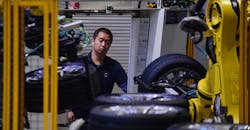Coronavirus’s Complex Threat: Will It Come for Supply or Demand?
The virus COVID-19 continues to confound marketplaces. Manufacturers worldwide are still working out precisely how the virus will negatively impact their business, and what that impact will look like. Automakers, for example, might see a negative supply impact, based on a reduced number of parts coming from China. Alternatively, their backup of parts might be enough to sate them until Chinese factories resume full production—in which case they might still be on the hook to see a negative demand impact from Chinese consumers battered by the outbreak.
According to the Detroit News, citing Mary Barra, GM’s supply chain is secured through March. “GM has cancelled all upcoming media product programs through April,” said a GM representative, including the debut of Cadillac’s Lyriq electric SUV. The decision to reveal GM’s new electric Hummer on May 20 is currently under review.
Meanwhile, Ford announced March 4 that it was suspending non-essential business travel after two of its China employees were diagnosed with COVID-19. Toyota Motor Corp. and Fiat Chrysler have also restricted travel.
Some affected automakers might get a helping hand. In a letter to members of the AASA, HDMA, MERA and OESA, MEMA President Bill Long wrote that an $8.3 billion coronavirus preparedness act signed March 6 could make up to $7 billion in loans to small, affected businesses. “If the situation worsens,” Long wrote, “these new SBA loans might benefit some MEMA member companies.” Long’s letter noted that applicants would have to “demonstrate economic harm due to the virus.”
Supply problems might not be carmakers’ primary concern, though. According to Michael Dunne, CEO of a Hong Kong advisory firm, the coronavirus’s largest impact might instead be in demand. “The larger danger, in my opinion, is a demand-size collapse” fueled by uncertainty, said Dunne during a Center for Automotive Research webinar.
If the viral outbreak does wind up undersupplying automotive companies, it might simultaneously pose an opposite threat to the steel industry. In an editorial for Real Clear Markets, Scott Paul, President of the Alliance for American Manufacturing, returned to an issue he’s raised the alarm on before: industrial overproduction. According to Paul, China’s state-sponsored steel companies can afford to produce more steel than there is profitable demand for, which floods the market and drives profits down.
And, Paul says, while other Chinese factories shut down entirely during the first months of the coronavirus outbreak, “the state-led steel sector only tapped its brakes.” The “glut of Chinese steel,” Paul says, is now about to enter the global market, and the only thing standing between it and a slowdown of the American steel industry are President Trump’s “Section 232” tariffs and some Obama administration anti-dumping duties. He urged the government to invest in steel infrastructure and to leave steel tariffs—which may soon face a constitutional challenge in the Supreme Court—in place.
About the Author
IW Staff
Find contact information for the IndustryWeek staff: Contact IndustryWeek
